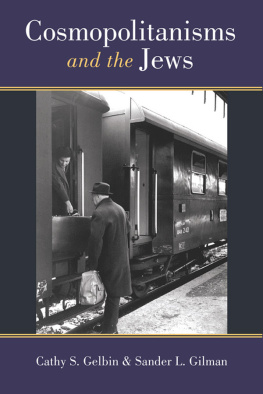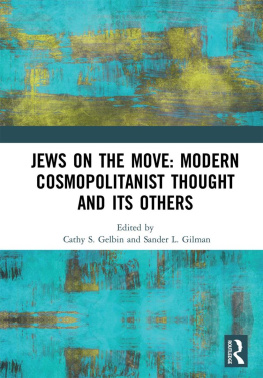Cathy S. Gelbin - Cosmopolitanisms and the Jews
Here you can read online Cathy S. Gelbin - Cosmopolitanisms and the Jews full text of the book (entire story) in english for free. Download pdf and epub, get meaning, cover and reviews about this ebook. year: 2018, publisher: University of Michigan Press, genre: Religion. Description of the work, (preface) as well as reviews are available. Best literature library LitArk.com created for fans of good reading and offers a wide selection of genres:
Romance novel
Science fiction
Adventure
Detective
Science
History
Home and family
Prose
Art
Politics
Computer
Non-fiction
Religion
Business
Children
Humor
Choose a favorite category and find really read worthwhile books. Enjoy immersion in the world of imagination, feel the emotions of the characters or learn something new for yourself, make an fascinating discovery.
- Book:Cosmopolitanisms and the Jews
- Author:
- Publisher:University of Michigan Press
- Genre:
- Year:2018
- Rating:3 / 5
- Favourites:Add to favourites
- Your mark:
- 60
- 1
- 2
- 3
- 4
- 5
Cosmopolitanisms and the Jews: summary, description and annotation
We offer to read an annotation, description, summary or preface (depends on what the author of the book "Cosmopolitanisms and the Jews" wrote himself). If you haven't found the necessary information about the book — write in the comments, we will try to find it.
Cosmopolitanisms and the Jews — read online for free the complete book (whole text) full work
Below is the text of the book, divided by pages. System saving the place of the last page read, allows you to conveniently read the book "Cosmopolitanisms and the Jews" online for free, without having to search again every time where you left off. Put a bookmark, and you can go to the page where you finished reading at any time.
Font size:
Interval:
Bookmark:

Social History, Popular Culture, and Politics in Germany
Kathleen Canning, Editor
Geoff Eley, Founding Editor
Recent Titles
Cathy S. Gelbin and Sander L. Gilman, Cosmopolitanisms and the Jews
Jay Howard Geller and Leslie Morris, Editors, Three-Way Street: Jews, Germans, and the Transnational
Deborah Ascher Barnstone, Beyond the Bauhaus: Cultural Modernity in Breslau, 191833
Pepper Stetler, Stop Reading! Look!: Modern Vision and the Weimar Photographic Book
Greg Eghigian. The Corrigible and the Incorrigible: Science, Medicine, and the Convict in Twentieth-Century Germany
Anna M. Parkinson, An Emotional State: The Politics of Emotion in Postwar West German Culture
Alexander Sedlmaier, Consumption and Violence: Radical Protest in Cold-War West Germany
Sandrine Kott, Communism Day-to-Day: State Enterprises in East German Society
Heather L. Gumbert, Envisioning Socialism: Television and the Cold War in the German Democratic Republic
Nina Berman, Klaus Mhlhahn, and Patrice Nganang, Editors, German Colonialism Revisited: African, Asian, and Oceanic Experiences
Scott Moranda, The Peoples Own Landscape: Nature, Tourism, and Dictatorship in East Germany
David Imhoof, Becoming a Nazi Town: Culture and Politics in Gttingen between the World Wars
A complete list of titles in the series can be found at www.press.umich.edu
Page iiiCathy S. Gelbin and Sander L. Gilman
University of Michigan Press
Ann Arbor
Page ivCopyright 2017 by Cathy S. Gelbin and Sander L. Gilman
All rights reserved
This book may not be reproduced, in whole or in part, including illustrations, in any form (beyond that copying permitted by Sections 107 and 108 of the U.S. Copyright Law and except by reviewers for the public press), without written permission from the publisher.
Published in the United States of America by the
University of Michigan Press
Manufactured in the United States of America
A CIP catalog record for this book is available from the British Library.
Library of Congress Cataloging-in-Publication data has been applied for.
ISBN: 978-0-472-13041-2 (hardcover : alk. paper)
ISBN: 978-0-472-12296-7 (ebook)
Page v Page viThis book represents a collaboration between two scholars whose interests overlap for both personal and academic reasons. Cathy S. Gelbin was born in the German Democratic Republic, the daughter of a Jewish-American father and a German mother. Educated in Wall-time West Berlin and the United States, where she received her doctorate, she has taught in Germany and the United Kingdom and is now at Manchester University. Sander L. Gilman, of Russian Jewish descent, was her doctoral supervisor at Cornell and now teaches at Emory University in Atlanta. He has taught at numerous universities in North America, Europe, Africa, and Asia. Both are Jewish, both are self-labeled cosmopolitans, and both are actively engaged in trying to understand what such a status means for their work in light of their biographical trajectories. This project has brought them together to examine the history into which they, in complex and fragmentary ways, fit.
The title of this volume evokes the multiple meanings of both cosmopolitan and Jew in the discourse about cosmopolitanism. Indeed, the term cosmopolitan is oftentimes contested as to exactly what type of cosmopolitanism can be denoted by that term. We can only speak of cosmopolitanisms as it is impossible easily to bring the distinctions between a moral cosmopolitism, such as that advocated by Martha Nussbaum, and the utilitarian cosmopolitanism of Peter Singer into the same conceptual category. The multiple, contradictory meanings of Jews constitute a well-known problem in postmodern theory since at least 1988 when Jean-Franois Lyotard published Heidegger et les juifs, evoking the jew (lowercased in the English translation) as the mark of ineffable alterity rather than lived experience. Thus we write of cosmopolitanisms and the Jews.
We do not seek to provide an exhaustive exploration of the oft-contradictory meanings of these two categories but rather to provide both a historical framework for their multiple meanings through detailed analyses of Page viii cultural productsnovels, plays, poetry, philosophical essaysthat illustrate the radical conceptual shifts associated with the notion of global mobility. Both authors are not only mundivagant but also define themselves as rooted in a specific national culture (or see themselves as suspended between these two experiential poles) and explored the complexity of cosmopolitanism in their works. Thus, we have taken the position that one of the functions of literature is to serve as a thought experiment for authors dealing, in our cases, with the questions of globalization, acculturation, migration, exile, national identity, and the like. We are quite aware that literature can have many other functions and can also be read in ways radically different than we have undertaken. Our project is a literary as well as a historical one. We hope that we have shown how relatively close readings of literary texts can be used to help frame the simultaneous contradictions and ambiguities of conceptual history, such as the history of the cosmopolitan that we have undertaken.
This volume was produced with the support of the Arts and Humanities Research Council in Great Britain and with the engagement of the Leo Baeck Institute for the Study of German-Jewish History and Culture (London). We thank Susannah Herzog for help with the preparation of the manuscript and Stephanie Schler-Springorum of the Center for Antisemitism Research, Berlin, for her support. LeAnn Fields, our editor at the University of Michigan Press, has been especially helpful in formulating the project.
Page 1In the twenty-first century, the debate surrounding cosmopolitanism has become a surrogate for thinking about the positive or negative aspects of the new globalization. Things change; things remain the same. From rootless riffraff at the turn of the twentieth century, the cosmopolitan has turned into a global elite at the turn of the twenty-first century.
Yet over and over again cosmopolitanism and its sister concept, nomadism, have taken on quite different meanings when their referent is the Jews. Once this litmus test is applied, both cosmopolitanism and nomadism are clearly revealed as symbolic manifestations of the antisemitic stereotype that associates Jews with capital. Over time, as we shall see, the related concept of the nomad gives way to that of the exile, the refugee, the D[isplaced] P[erson]. The association with capital also wanes but never quite vanishes. This is also part of the tale. Such a history of the cosmopolitan points toward the ambivalence of these concepts when applied in the present day to specific categories of social and geographic mobility, whether they refer to the Jew, the asylum Page 2 seeker, the migrant, the undocumented immigrant. The riffraff of Edwardian London and of Wilhelminian Germany may have transmuted into the global citizen of the twenty-first century in some instances, but the aura of the corrupt and corrupting, of the rootless and the transitory, of the foreign and the unhoused always remains beneath the surface and shapes the sense of what it means to be cosmopolitan and global. And as such it impacts on the self-image of those so defined as mundivagant.
Font size:
Interval:
Bookmark:
Similar books «Cosmopolitanisms and the Jews»
Look at similar books to Cosmopolitanisms and the Jews. We have selected literature similar in name and meaning in the hope of providing readers with more options to find new, interesting, not yet read works.
Discussion, reviews of the book Cosmopolitanisms and the Jews and just readers' own opinions. Leave your comments, write what you think about the work, its meaning or the main characters. Specify what exactly you liked and what you didn't like, and why you think so.












